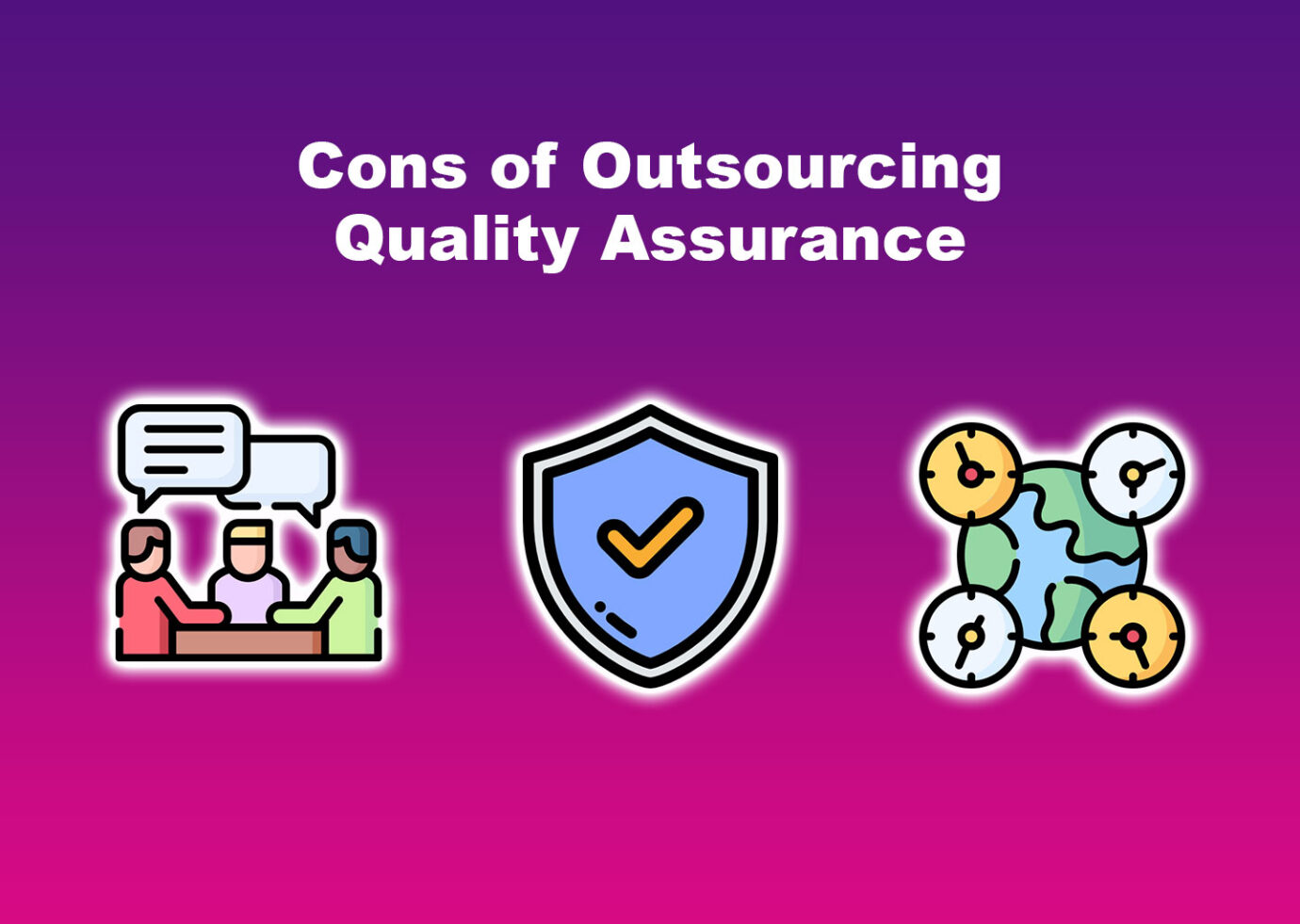All products need quality checking before rolling them out for release in the market. Companies that skip this increase the risk of failing customer expectations. They may need to roll back their prices or, worse, do a product recall or service refund.
Quality assurance and testing reduce the risk of recalling your products. This assures your company and its investors that the financial resources are safe from bankruptcy.

But if you have a tight budget and cannot afford to build an in-house team, you can try outsourcing your required tests and quality assurance. In this article, we give you insights on quality assurance outsourcing so you can make informed decisions going forward.
What Is Quality Assurance Outsourcing?
Quality assurance outsourcing means paying for third-party services to conduct quality assurance (QA) activities. These activities include auditing and analyzing product quality and final regression testing before product release. Outsourcing QA activities can also be done on a one-time or project basis.
When you conduct quality assurance testing, you close the gaps in any product or project’s non-compliance to specific standards. Once you establish a set of quality standards, you can replicate this to other products or services your company offers. QA creates and upholds standards for making or producing reliable products.
Why Is Quality Assurance Important?
Companies that produce high-quality products stay competitive and stand out in the market. Customers are also more likely to stick with brands that regularly satisfy their needs. For these to be achieved, companies must have quality assurance practices.
Here are some reasons why outsourcing quality assurance is vital for companies:
1. It Ensures Consistency
With quality assurance, the quality of products and services is consistent. This is because they follow standards before being released to the market. Without concrete standards that arose from QA testing, a company won’t be able to establish a reliable brand reputation.
For example, a bakery that sells goods that are sometimes tasty but other times not will be unable to gather loyal customers. If the bakery can replicate the taste and quality of its baked goods, then there’s a high probability of customers lining up to buy their products.
The bottom line is that if products are consistently high-quality, customers will keep buying them.
2. It Enhances Customer Satisfaction

Clients can also provide feedback on their purchases when QA policies are in place. Companies can then check how to improve processes and quality to meet customer needs. Once the changes are applied to their products and services, customers will be more satisfied and feel heard and important.
Products that consistently improve gain more attention than stagnant ones. As customer needs are ever-changing, companies need to keep track of them and adjust accordingly.
3. It Leads to Long-term Profit
Once you build a reliable product reputation, your company’s name will also become reputable. Clients are highly likely to trust familiar brands that satisfy or exceed their expectations. The higher the number of clients who trust your brand, the higher the possibility of increasing or maintaining profit long-term.
Quality assurance may seem time-consuming at first, but companies and businesses that have tried it are now reaping its numerous benefits.
Take Apple, for example. They continuously improve software and hardware quality to meet customer demands. As a result, users stay loyal to the brand despite other gadgets popping out in the market.
4. Creates Standards for High-Quality Products
Companies follow strict QA procedures to ensure their products are defect-free and meet customer expectations. This prevents customers from returning their products and leaving bad reviews online.
QA processes are rigorous and replicable to ensure that all products and services are high-quality. Your company is responsible for making sure that what you sell isn’t a waste of money. You’ll produce great products if you have solid standards before you release them.
Here’s another take on Why Quality Assurance is Important.
What Does Quality Assurance Do For Companies?
Quality assurance helps companies ensure that their products meet market and consumer standards. It allows companies to create products that satisfy their consumers’ needs and ensures consistency in product quality and profit.

Almost every big company maintains a set of quality assurance standards and processes. This ensures business continuity and competitiveness by keeping consumers trust in their brands.
Why Should You Outsource QA Testing?
Small businesses and start-ups outsource several functions to accomplish internal processes that take too much time. One function is QA testing, which requires a specific type of expertise, keen attention to detail, and enough time to accomplish.
These are the reasons why you need to outsource quality assurance testing:
1. Outsourced QA Testers Are Experts
If your product release is near and none of your employees can handle quality assurance tasks, you should outsource it instead. Hiring a new staff member might not be the best option if you need to meet a tight deadline. Outsourcing your quality assurance and testing is a better choice, as it won’t push back your target release date.
In this case, it’s better to outsource your quality assurance and testing, as it won’t push back your target release date. Just make sure you make them sign a non-disclosure agreement or include confidentiality clauses in your contract.
2. Outsourced QA Testers Can Impart Fresh Ideas
Working weeks or even months on one project will make your team too familiar with it. When this happens, they might not be able to notice flaws or minor details that need improvement. You can let another in-house team look at it, but that would take up too much of their time.
If you badly need fresh ideas for improving the product, it’s time to outsource quality assurance services. A new perspective can help you improve your product. They can also automate the process for you to get faster results. With this, your team can focus better on pending tasks, saving you precious time.
3. You Have Tight Deadlines
If you have too much on your plate without enough time to finish your projects, the release of your products may be delayed. When this happens, your team might miss minor defects, which would result in a negative backlash from your clients. To avoid this, you should outsource your quality assurance processes to check on your products.
The good thing about outsourcing such services is that they can be project-based or long-term. You can save time and money, and you can also benefit from the flexibility of services.
How to Outsource Quality Assurance
Finding an efficient and trustworthy quality assurance outsourcing company is hard at first. But once you learn to outsource effectively, you’ll have no problem doing it again.
Here’s how to outsource quality assurance:
Step 1: Research Contractors

You can’t just hire someone without a proper background check. This also applies to quality assurance outsourcing companies. When researching, take note of their work culture, previous experience, financial standing, and company reviews.
Afterward, you can narrow down the list of vendors. Make sure to choose ones with a good background and outstanding client ratings.
Step 2: Interview the Vendor

Ask them about their language and communication skills, their expertise in the QA services you want to outsource, and whether they can meet your objectives and timeline.
In this step, you can also ask them about issues they faced in the past and how they resolved them. This will give you an idea of their work ethics and conflict resolution capabilities.
Step 3: Leverage on Free Trials

The best thing to find out if the shoe fits is if you try out their services first. Some outsourcing companies offer free trials. It’s usually non-committal, so you won’t have to worry about signing the contract immediately.
If they live up to or even exceed your expectations, you’ve just discovered the ideal QA outsourcing partner.
Check out this article on How to Find a Good Partner from Forbes.
If your outsourced customer service team is helping you retain your customer, learning how to scale a sales team is the next step to reach a broader market.
Pros of Outsourcing Quality Assurance
Like other outsourced services, outsourcing quality assurance has advantages and disadvantages. It’s essential to consider these, especially if you’re in it for the long haul.
Here are the pros of outsourcing quality assurance needs:
- Quicker Results.
Compared to hiring and training internally, outsourced QA personnel can work faster. This greatly benefits you, especially if you have tight deadlines before your products or software release. - Access to QA Experts.
They can bring fresh perspectives and expert opinions to the table. QA experts can also enhance the quality assurance process as they know industry-accepted QA standards. - Save Costs.
Outsourcing quality assurance and testing can help you save money on maintaining internal QA staff. It removes the need to spend on training, bonuses, insurance, and other employee benefits. - QA Automation.
QA specialists can automate various tests, including functional testing, performance testing, and security testing.
Cons of Outsourcing Quality Assurance

These are the cons of outsourcing quality assurance:
- Security Issues.
Sensitive and proprietary information is shared to successfully conduct QA and testing processes. You must carefully check the security and privacy policies of the outsourced resource to avoid data leakage and other security concerns. - Communication Challenges.
Most outsourced resources communicate remotely. There are times when clients receive late replies. Other times, they have poor internet connection as well. There could also be language barriers, so settling that during the interview is essential. - Time Zone Difference.
Even in online communication, the time zone also matters. Some outsourced QA personnel aren’t available during your day–the time you’re active. This is especially hard when you need urgent data on something they can only provide. - Quality Deficiency.
Since the services are outsourced, they’re still outsiders. They might not profoundly understand your company’s culture, goals, and vision. This may cause gaps between your expectations and the outputs they produce.
What Are Quality Assurance Practices?
Quality assurance is conducted by testers, software developers, system administrators, and a support team. They identify whether a product needs manufacturing errors, security improvements, or process improvements.

Here are some of the quality assurance practices:
- Software Testing Processes.
This process includes unit testing, integration testing, system testing, and acceptance testing. It allows the QA team to ensure that the system operates correctly. - Peer Evaluations of Deliverables.
This is when a developer other than the code’s author examines and tests the usage of a piece of code. They help provide a fresh pair of eyes to check if there’s any minor detail to improve on. - Inspection.
This practice for quality control verifies that goods and procedures are up to standard. - Test Preparation.
This process is when QA testers analyze the requirements, plan, and design tests for the product or software. - Test Execution.
Once the test plans are finalized, the QA team conducts the tests and logs the results. - Reporting of Results.
In this process, all logged results are reported. QA testers analyze the data to determine whether the tests need to be re-run.
The above practices are needed to ensure a product’s consistent quality and fulfill customer expectations.
Here are Quality Assurance Examples and How to Implement QA Systems for further reading.
Outsourcing Quality Assurance Is Important
It’s not easy to outsource quality assurance and testing, as it involves highly confidential data such as your software source code. But if you find the right partner, you won’t have to worry about this anymore.
Outsourcing your quality assurance needs will help you today, especially if you don’t have the right staff. You can invest in a QA test team, but this will take time. Ultimately, it’s up to you if you want to outsource now or if you’d like to take your time building an in-house team instead.